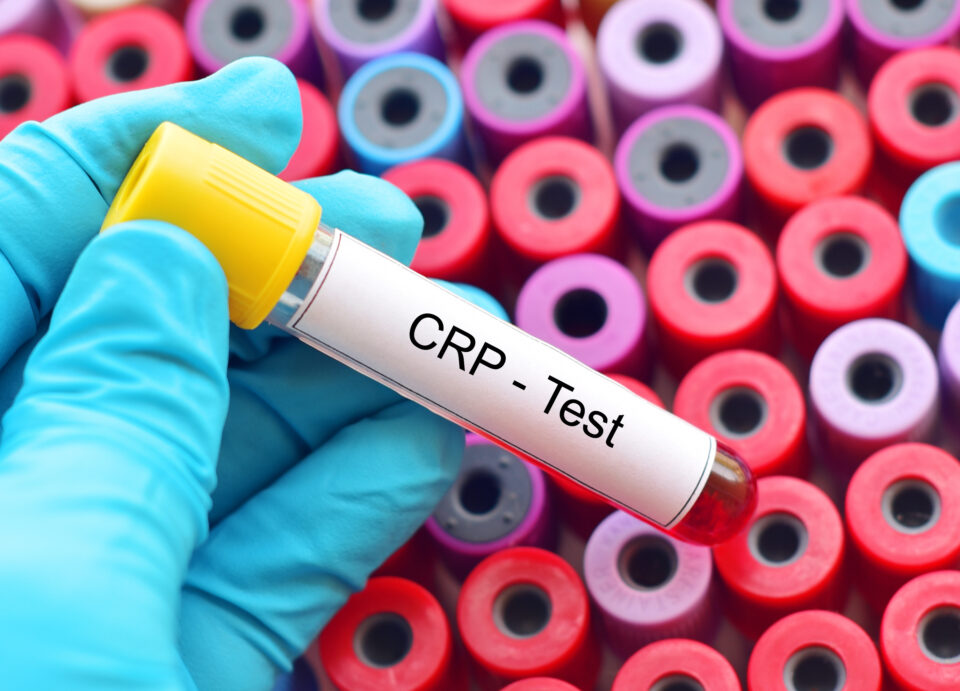CRP: A Critical Marker of Inflammation


 Have you ever wondered how you can know if you have inflammation in your body or not? Inflammation is a natural process in the body that’s critical to healing from a wound or illness but if left unchecked and chronically high due to irritation from a poor diet, lack of sleep, a sedentary lifestyle, underlying chronic disease, or high levels of emotional stress, the body can experience long-term, damaging inflammation.
Have you ever wondered how you can know if you have inflammation in your body or not? Inflammation is a natural process in the body that’s critical to healing from a wound or illness but if left unchecked and chronically high due to irritation from a poor diet, lack of sleep, a sedentary lifestyle, underlying chronic disease, or high levels of emotional stress, the body can experience long-term, damaging inflammation.
To determine if you may have systemic inflammation, a C-reactive protein (CRP) blood test is a simple way to see if you might have high levels of this protein that indicate irritation in the body. This lab could tell you a lot about your health. Doctors test CRP levels (or sometimes high-sensitivity or “hs” CRP) in the blood to see if you have inflammation or an infection but CRP can also be an indicator of heart health. Chronically high levels of CRP have been linked to an increased risk of heart attacks and for people who have already had a heart attack, high CRP levels actually indicate that they may be more likely to have another one.
The confusing part about CRP is that it doesn’t tell you where the inflammation is coming from. If you get a CRP blood test and you have an injury such as a cut, recent surgery, virus like a cold or flu, or even a joint injury, it will likely be elevated in response to that irritation in the body. Because it’s a highly sensitive yet non-specific lab, many medical providers will suggest having it drawn annually and looking at trends over time to tell your true risk.
 Elevated CRP levels are linked to:
Elevated CRP levels are linked to:
- High cholesterol in the blood
- Heart attack risk
- Inflammatory bowel disease (Crohn’s disease and ulcerative colitis)
- Lung diseases like asthma
- Autoimmune diseases (lupus, rheumatoid arthritis, multiple sclerosis, etc.)
- Poorer outcomes for people who have certain types of cancer (prostate, breast, kidney, colorectal, lung, blood, and pancreatic among others)
- Other inflammatory conditions like osteoarthritis
Here are some ways that CRP can be used to assess your health, and how to take action against inflammation in ways that will positively affect your heart and other vital organs:
 CRP and Heart Health
CRP and Heart Health
Your CRP level can show possible heart problems because inflammation in the walls of blood vessels is linked to cholesterol build-up inside the blood vessels. People with higher cholesterol build up often have more CRP circulating in their blood. Furthermore, CRP levels can help people at higher risk of heart issues. Cholesterol testing, despite its many benefits, has some limitations because studies show that only about half of people who have heart attacks have high cholesterol levels. Inflammation may be another indicator of heart problems making CRP a useful test that can help your medical team better understand your risk of heart disease in the future.
 Measuring CRP Levels
Measuring CRP Levels
Your blood can give important information about your heart health. Normally, you have a little bit of CRP in your blood. If the body is inflamed, your liver releases more CRP into your blood. If your CRP levels are high, it might mean you have a health problem causing inflammation . . . or you’re at risk of chronic inflammation causing health problems or making existing ones worse. CRP levels can go up temporarily in different situations, like when you have a cold or after a hard workout.
Generally, CRP levels are most desirable at less than 2 to 5 milligrams per liter (mg/L). Levels of 8 to 10mg/L might suggest the presence of inflammation. When your health care provider combines this test with other results and factors related to heart disease like blood pressure, blood sugar, and cholesterol levels, they can get a better idea of your overall heart health.
CRP is a simple and affordable blood test that can tell you about your possible inflammation and heart health. Ask your health care provider if you may benefit from having your CRP levels measured for a holistic approach to your health care and risk of disease.